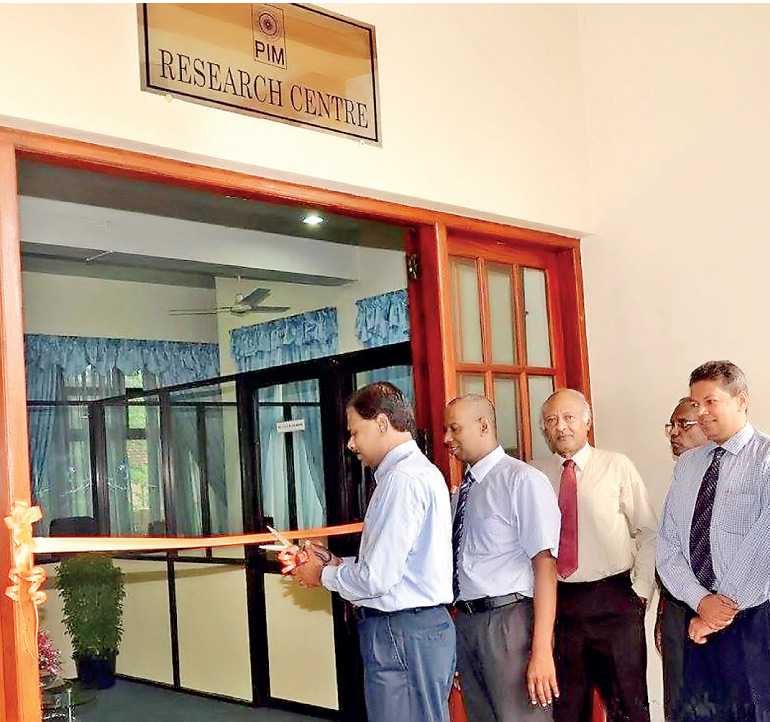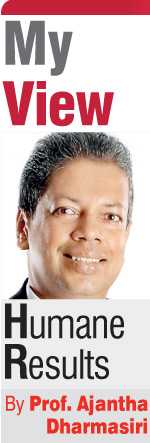Friday Feb 27, 2026
Friday Feb 27, 2026
Monday, 7 September 2020 00:15 - - {{hitsCtrl.values.hits}}

Opening of PIM research centre, where late Prof. Sisira Jayakody (second from left) was the Head. Late Prof. Uditha Liyanage, Prof. Tilak Fonseka (third from the left), Dr. A.K.L. Jayawardena and Prof. Ajantha Dharmasiri are also present
Post-COVID-19 pandemic presents multiple challenges that need managerial responses. Management is more a practice that cuts across many professions, and increasingly becoming crucial in ensuring survival and success in all fronts. 
Management research, sadly is not as vibrant as research in other disciplines due to multiple reasons. We have a dearth of management scholars in Sri Lankan context. The sad demise of Prof. Sisira Jayakody, Head of the research centre of the Postgraduate Institute of Management (PIM), and also the Director of the Institute of Human Resource Advancement (IHRA), University of Colombo, prompted me to reflect on the richness of management research with its associated relations.
Overview
“Research is to see what everybody else has seen, and to think what nobody else has thought”, so said Albert Szent-Gyorgyi, a Nobel Prize winning Hungarian psychologist. It is, in fact, developing a third eye to see beyond what is obvious. The field of management in Sri Lanka, both private and public sectors alike can immensely benefit if more insights beyond mere information would be the norm in making policy decisions. Management research is of utmost importance, in this sense, globally and locally alike.
Management research is a part of the wider array of social research. As many of us have come across, management research is viewed as “a systematic, data-based, critical, objective, scientific investigation into a specific problem, undertaken with the purpose of finding answers or solutions to it” (Sekaran & Bougie, 2013:2). Whilst positive initiatives are being taken, current situation with respect to research in Sri Lanka is far from a satisfactory level. Pinikahana (2013) highlighted the need to focus on for private sector to collaborate in university research, where he states that “Sri Lanka contributes only 0.17% from GDP whereas Singapore contributes 2.3%, South Korea, 2.9% and China, 1.3% from their GDP for research”.
“It is time to deviate from traditional concept of university research and establish some links with the industry, both public and private for collaborative research”, he concludes. This highlights the need to “reach the unreached” in conducting management research, aptly justifying the theme. In fact, it has a global and local relevance. Bennis and O’Toole (2005) lamented that “too focused on “scientific” research, business schools are hiring professors with limited real-world experience and graduating students who are ill equipped to wrangle with complex, unquantifiable issues in other words, the stuff of management.” It clearly points to the need to have “rigour, relevance and reach”.
In such a context, any move to strengthen the research rigor, particularly among the University community is commendable. As I observe, there is a clear need to create better awareness on the importance of research. Academics can play a pivotal role here. Academics engage in scholarly activities. They deal with knowledge in playing multiple roles. They have to think and act as knowledge creators as well as knowledge sharers. Academics influence the attitudes and aptitudes of student community. Superiority in scientific thinking, blended with socio-cultural realities is what an academic should smartly possess. Academics should shift from their perennial plight of “publishing or perishing” to a new paradigm of “thought leadership”. Such a transformation requires vision and passion. Overcoming socio-economic as well as religio-cultural barriers in moving ahead with a strong intrinsically-driven motivation is the need of the hour.
The starting point is the role of “knowledge capturer”. This includes the learning dimension of an academic. We learn from the womb to the tomb, as life-long learners. I prefer to be called as a management learner than an “expert”. This is more relevant in the context of change, where knowledge is rapidly getting obsolete. Particularly, in the areas of Information, Communication and Technology (ICT), the rate of knowledge updating seems more rapid.
This is where the academics have to explore new knowledge. They should have the mindset of exploration. It reminds me of a story that I heard about an elderly professor. He was serving in a residential campus in a European city, staying in the upper-most floor of the building complex. His room was well lit early morning and the students could see him reading. Among the students, they were discussing as to why this veteran still suffers in getting up so early to read. One student had the guts to go and ask from him, as to why he is doing so. The professor gave a profound answer. “I would rather you drink from a flowing fountain than from a stale pond”.
Upon reflecting, I was wondering whether we Sri Lankan academics are more “flowing fountains” or “stale ponds”. We might be hurriedly offering re-cycled knowledge over and over again to cater for ever-increasing lecture demand. Hence, the knowledge capturing dimension suffers and opportunity to review and renew oneself gets neglected.
The second state is where academics perform as “knowledge communicators”. It highlights the traditional role of teaching. Communicating knowledge does not necessarily mean lecturing. We at the Postgraduate Institute of Management (PIM), have been practicing, what we call four modes of teaching. They refer to “tell, ask, show and do”. Telling means the typical lecturing. Asking means to engage the learning community by raising questions expecting answers from them. Showing refers to audio – visual interventions such as documentaries, movie extracts, video recordings, internet-based resources such as YouTube etc. Doing means to get the student community to engage in group discussions. In a typical three hour “session” (we prefer this as opposed to a lecture), roughly one third would be telling.
I see clear issues among us, Sri Lankan academics in this respect. Are we loading students with knowledge through one-way communication in making them mere receivers? They would easily resort to “parrot technique” in memorising everything and reproducing at the exam with spelling and grammar errors. Are we being challenged by the student community sufficiently, in leading to a meaningful interactive discussion? I might be biased here in basing on mostly post-graduate teaching experience. Yet, irrespective of what level an academic has to tackle, an appropriate adaption is always possible.
The pinnacle is where academics perform as “knowledge creators”. This is where the research comes into the limelight. Sri Lankan academics should reach the pinnacle of knowledge pyramid in becoming knowledge creators. Relevant research with rigor and results is the need of the hour.
Bartunek et al (2001) highlight that there is a considerable gap between organisational research findings and management practices. As they observe:
“Although volumes have been written about the probable causes and consequences of this gap, surprisingly little empirical evidence exists concerning the various viewpoints. The articles in this forum provide data on the role of academic-practitioner relationships in both generating and disseminating knowledge across boundaries. The contributions of each article are summarised in light of recent theories of knowledge creation, and suggestions are made for increasing the value and relevance of future research to both academics and practitioners”. (Bartunek et al, 2001: 1)
In such a context, any move to strengthen the research rigor, particularly among the University community is commendable. As I observe, there is a clear need to create better awareness on the importance of research. This I see acutely in the field of management.
Demise of a rare researcher
I think this is the backdrop where the loss of late Prof. Sisira Jayakody is much felt. He was a product of the Faculty of Management Studies and Commerce of the University of Sri Jayewardenepura with his MBA and Ph.D. from the Postgraduate Institute of Management (PIM). He was a leading scholar in management research during our times in raising the bar of scholarly work with international accolades. As Prof. Nalin Abeysekera, one of his students, highlighted in a recent column, publishing in journals like International Journal of Bank Marketing, Journal of Management Development, The International Journal of Human Resource Management, Contemporary Management Research, Journal of Knowledge Management and Management Decision is a rare feat of an accomplished academic.
I recall with a deep sense of sadness how we intellectually interact during our doctoral programme at the PIM, where veterans such as Prof. Uditha Liyanage challenged us to be conceptually sharp. Prof. Jayakody had the innate humbleness of associating with the research community in a friendly and supportive manner. He was a researcher with global reach and local roots. Raising the standards of research at PIM in becoming its first Head of the Research Centre, and contributing immensely for the success of our Doctoral program was very noteworthy. His contribution as an editorial member of the most longstanding management journal in Sri Lanka, viz. Sri Lankan Journal of Management (SLJM) is indeed commendable.
Way forward
Management research has a long way to go in ensuring the consistent reaching the unreached, with needed insights for improvements. With awareness of the content, and familiarity of the contents, the committed conduct with clarity and coherence is what is required. The way to fill the void created by the demise of veterans such as Prof. Jayakody is to take the baton and march forward in confidence as like-minded management researchers for betterment of humanity. The management research community who were near and dear to him will definitely do so.
(The writer can be reached through [email protected], [email protected] or www.ajanthadharmasiri.info.)